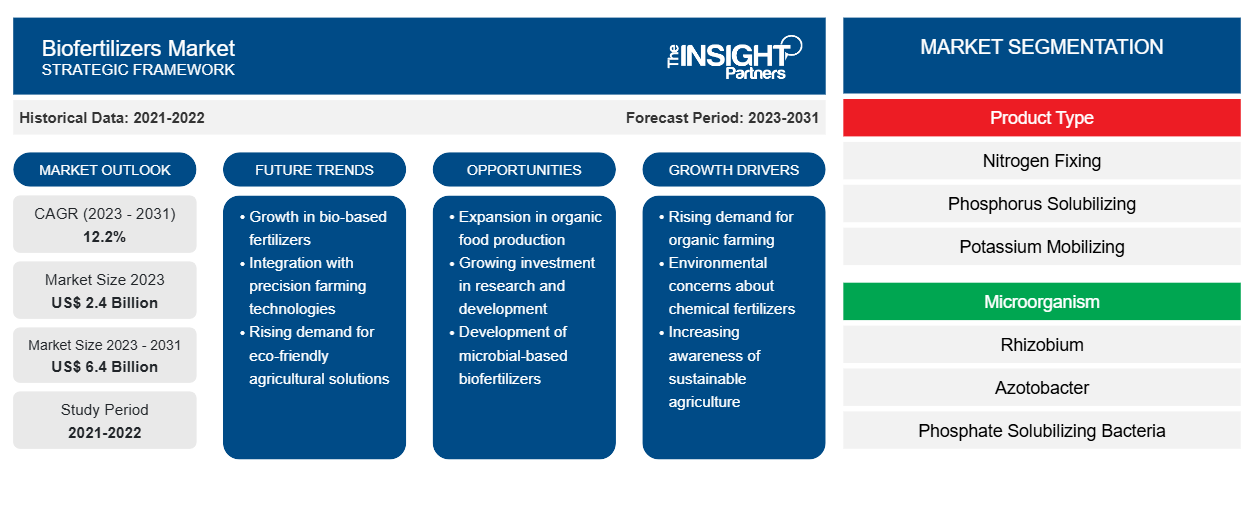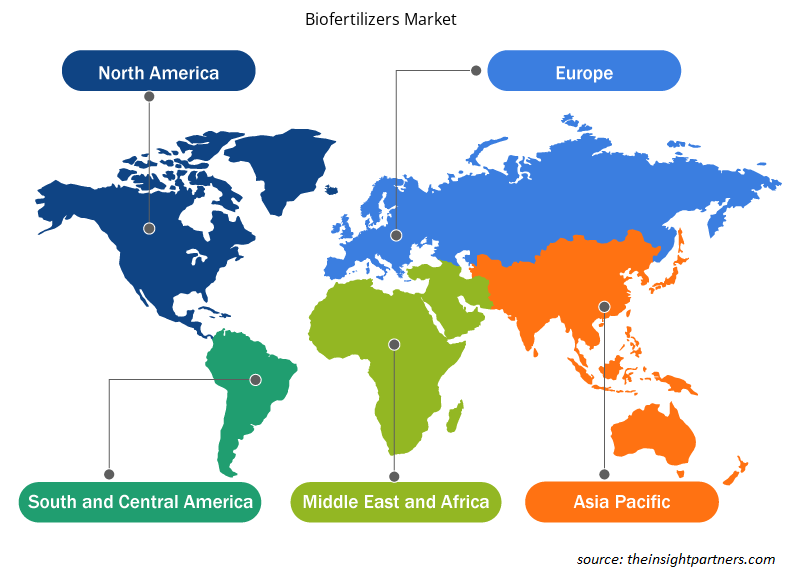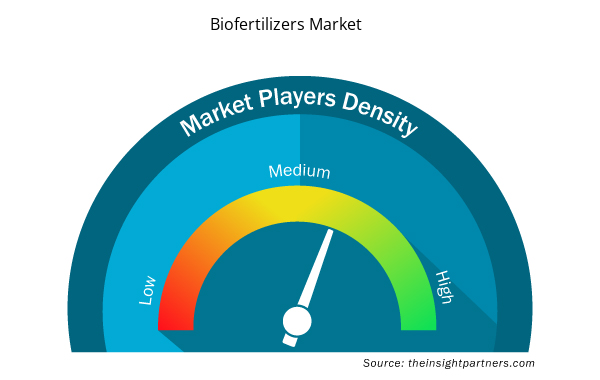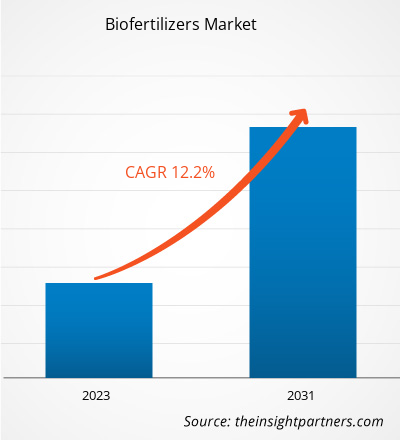The biofertilizers market size is projected to reach US$ 6.4 billion by 2031 from US$ 2.4 billion in 2023. The market is expected to register a CAGR of 12.2% during 2023–2031. The increasing focus of manufacturing companies on innovation and providing new products to enhance the customer's experience are likely to remain key trends in the biofertilizers market.
Biofertilizers Market Analysis
Organic farming method includes the growth and nurturing of crops with the utilization of biological materials by eliminating the use of synthetic-based fertilizers. Organic farming is being increasingly adopted for achieving healthy and high-quality food products. Along with this, organic farming provides several environmental benefits; for example, it improves soil fertility, helps combat soil erosion, and reduces greenhouse gas emissions. Biofertilizer is one of the essential components of organic farming practices because it combines naturally occurring microorganisms with organically derived, nutrient-rich fertilizers that provide healthy growing environment to plants and soils. Biofertilizers also help enhance the plant’s resistance against pests and abiotic stressors such as drought, excess water, and extreme changes in temperature. Thus, rapid growth in organic farming due to increased adoption of organic products by consumers across the world is driving the biofertilizers market growth.
Biofertilizers Market Overview
Biofertilizers consist of microbes and living bacteria that promote the fertility of the soil and the growth of plants. These microbes support the process of nitrogen fixation to produce the components essential for the plant’s growth. Biofertilizers are well known for their cost-effectiveness, and environment-friendly nature. The biofertilizers market is witnessing high demand due to a shift in trend toward sustainable agriculture. The growing interest and government support in organic agriculture has brought a boom in the biofertilizer industry. Thus, the biofertilizer market is expected to bolster its growth during the forecast period.
Customize This Report To Suit Your Requirement
You will get customization on any report - free of charge - including parts of this report, or country-level analysis, Excel Data pack, as well as avail great offers and discounts for start-ups & universities
Biofertilizers Market: Strategic Insights

- Get Top Key Market Trends of this report.This FREE sample will include data analysis, ranging from market trends to estimates and forecasts.
Customize This Report To Suit Your Requirement
You will get customization on any report - free of charge - including parts of this report, or country-level analysis, Excel Data pack, as well as avail great offers and discounts for start-ups & universities
Biofertilizers Market: Strategic Insights

- Get Top Key Market Trends of this report.This FREE sample will include data analysis, ranging from market trends to estimates and forecasts.
Biofertilizers Market Drivers and Opportunities
Rising Government Initiatives and Increase in Awareness Regarding Sustainable Agriculture Technique
Governments of various countries are taking initiatives to propel the adoption of biofertilizers. For instance, in India, various state governments have been supporting the use of biofertilizers over chemical or synthetic fertilizers through programs or schemes such as “Paramparagat Krishi Vikas Yojana (PKVY)” and “Mission Organic Value Chain Development for Northeastern Region (MOVCDNER).” Further, the “Common Agricultural Policy” by the European Union (EU) aims to promote the use of biological resources across the region. Thus, government initiatives, along with the increased inclination toward sustainability in modern agriculture, trigger the demand for biofertilizers across the world.
Increase in Production and Yield of Crops
The application of biofertilizers is one of the potential technologies for sustainable farming systems. Famers are widely using nitrogen-fixing phosphate solubilizing bio-fertilizers to produce high-demand crops such as wheat, oilseeds, and rice. Thus, different microorganisms are included in biofertilizers to help increase the production and yield of crops, thereby providing various growth opportunities for the biofertilizers market across the world.
Biofertilizers Market Report Segmentation Analysis
Key segments that contributed to the derivation of the Biofertilizers Market analysis are product type, microorganism, crop type, and application.
- Based on product type, the biofertilizers market is divided into nitrogen fixing, phosphorus solubilizing, potassium mobilizing, and others. The nitrogen fixing segment held the largest market share in 2023.
- By microorganism, the market is segmented into rhizobium, azotobacter, phosphate solubilizing bacteria, and others. The rhizobium segment held the largest share of the market in 2023.
- In terms of crop type, the market is segregated into cereals and grains, oil seeds and pulses, fruits and vegetables, and others. The cereals and grains segment dominated the market in 2023.
- By application, the market is segregated into seed treatment, soil treatment, and others. The seed treatment segment dominated the market in 2023.
Biofertilizers Market Share Analysis by Geography
The geographic scope of the biofertilizers market report is mainly divided into five regions: North America, Asia Pacific, Europe, Middle East & Africa, and South America/South & Central America.
North America has dominated the biofertilizers market. North America is one of the prominent regions for the biofertilizers market owing to the increasing consumption of chemical-free and organic food across the region. Moreover, the US is among the significant producers of biofertilizers around the world; although chemical fertilizers are not usually labelled ‘healthy,’ consumers look for healthier alternatives such as biofertilizers. One of the market drivers, according to DOE and USDA, is the abundant supply of biomass raw materials. These are some of the factors boosting the demand for biofertilizers in the North American countries. Asia Pacific is anticipated to grow with the highest CAGR in the coming years.
Biofertilizers Market Regional Insights
The regional trends and factors influencing the Biofertilizers Market throughout the forecast period have been thoroughly explained by the analysts at Insight Partners. This section also discusses Biofertilizers Market segments and geography across North America, Europe, Asia Pacific, Middle East and Africa, and South and Central America.

- Get the Regional Specific Data for Biofertilizers Market
Biofertilizers Market Report Scope
| Report Attribute | Details |
|---|---|
| Market size in 2023 | US$ 2.4 Billion |
| Market Size by 2031 | US$ 6.4 Billion |
| Global CAGR (2023 - 2031) | 12.2% |
| Historical Data | 2021-2022 |
| Forecast period | 2023-2031 |
| Segments Covered |
By Product Type
|
| Regions and Countries Covered | North America
|
| Market leaders and key company profiles |
Biofertilizers Market Players Density: Understanding Its Impact on Business Dynamics
The Biofertilizers Market market is growing rapidly, driven by increasing end-user demand due to factors such as evolving consumer preferences, technological advancements, and greater awareness of the product's benefits. As demand rises, businesses are expanding their offerings, innovating to meet consumer needs, and capitalizing on emerging trends, which further fuels market growth.
Market players density refers to the distribution of firms or companies operating within a particular market or industry. It indicates how many competitors (market players) are present in a given market space relative to its size or total market value.
Major Companies operating in the Biofertilizers Market are:
- AgriLife
- Biotech International Ltd.
- Kiwa Bio-Tech Products Group Corporation
- Mapleton Agri Biotec Pt Ltd.
- Novozymes
- RIZOBACTER
Disclaimer: The companies listed above are not ranked in any particular order.

- Get the Biofertilizers Market top key players overview
Biofertilizers Market News and Recent Developments
The biofertilizers market is evaluated by gathering qualitative and quantitative data post primary and secondary research, which includes important corporate publications, association data, and databases. The following is a list of developments in the market for speech and language disorders:
- Syngenta Biologicals and Unium Bioscience announce a collaboration to bring breakthrough biological seed treatment solutions based on NUELLO® iN to farmers across northwest Europe. (Source: Syngenta, Newsletter, 2023)
- Performance Nutrition introduced its NutriWise brand, a granular fertilizer and water-soluble powder that will replace the old NutriSmart product line. The new products are available for the agricultural, turf and ornamental markets. (Source: LidoChem, Inc., Press Release, 2022)
Biofertilizers Market Report Coverage and Deliverables
The “Biofertilizers Market Size and Forecast (2021–2031)” report provides a detailed analysis of the market covering below areas:
- Market size and forecast at global, regional, and country levels for all the key market segments covered under the scope
- Market dynamics such as drivers, restraints, and key opportunities
- Key future trends
- Detailed PEST/Porter’s Five Forces and SWOT analysis
- Global and regional market analysis covering key market trends, major players, regulations, and recent market developments
- Industry landscape and competition analysis covering market concentration, heat map analysis, prominent players, and recent developments
- Detailed company profiles
- Historical Analysis (2 Years), Base Year, Forecast (7 Years) with CAGR
- PEST and SWOT Analysis
- Market Size Value / Volume - Global, Regional, Country
- Industry and Competitive Landscape
- Excel Dataset



Report Coverage
Revenue forecast, Company Analysis, Industry landscape, Growth factors, and Trends

Segment Covered
Product Type, Microorganism, Crop Type, and Application

Regional Scope
North America, Europe, Asia Pacific, Middle East & Africa, South & Central America

Country Scope
Argentina, Australia, Brazil, Canada, China, France, Germany, India, Italy, Japan, Mexico, Russian Federation, Saudi Arabia, South Africa, South Korea, United Arab Emirates, United Kingdom, United States

 Get Free Sample For
Get Free Sample For